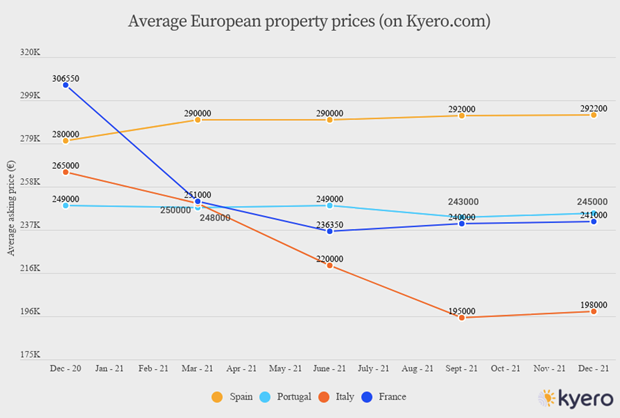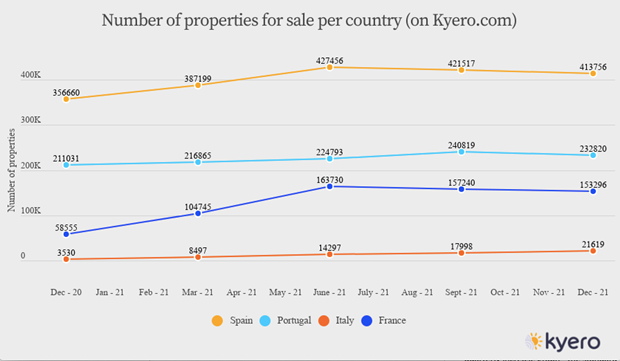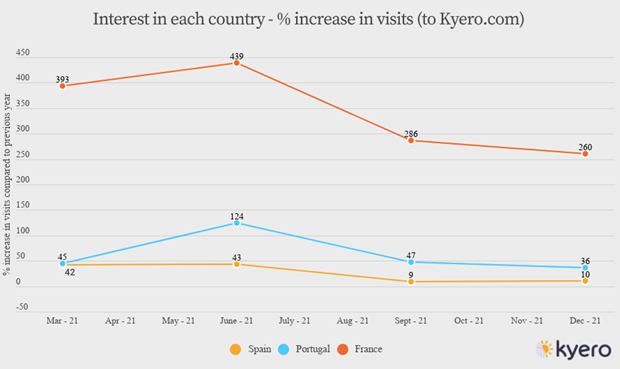European House Buying Shows No Sign Of Slowing Down

New data released today from overseas property portal, Kyero.com, shows a steady rise in interest in European house buying in the 12 months since Brexit. Kyero, which has over 820,000 European properties listed on its site, making it the largest overseas property portal in the UK, saw a 45% increase in visitors searching for property in 2021 compared to 2020.
Kyero has seen enquiries up in all four of the key European markets (Spain, Portugal, France and Italy) during Q4 2021 compared to the same period in 2020. In Spain, Kyero’s largest market, property enquiries were up 28% year-on-year in Q4 compared to 2020, while in Portugal they are up 48%.
The data, taken from the Q4 edition of the Kyero European Property Market Tracker shows that far from putting people off, the possible red tape and issues caused by Brexit are not hampering people looking for a new life in the sunshine. The Brexit trade deal has now been in place for a year, coming into effect on 1st January 2021 and marking the end of the Brexit transition period.
Louise Dell, founder of Kyero says:
“Despite Brexit making it slightly more complicated to move to Europe, it doesn’t seem to have had any long-term impact on the appetite for overseas buyers looking for homes in the sun. In fact, Brexit may even be a driver for some Brits looking to move to Europe in order to maintain the feeling of being European rather than British post-Brexit and securing easier access to the rest of the continent.
In addition, we’re still seeing the impacts of Covid-19 at play. Free from the office, many more people can now live and work from anywhere, with lots choosing to do so from Spain, Portugal, France or Italy rather than the UK.”
Moving to Spain after Brexit
Spain remains the most popular location for Brits to move to in Europe and with over 400,000 properties listed, it is Kyero’s largest market. Average property prices have remained static in Spain over the last quarter at €292,000. Post-Brexit there are some important differences when it comes to move to Spain
- Travelling to Spain: UK Citizens no longer have the same rights in EU countries as they did before Brexit. If you want to travel to Spain, you must have at least 6 months left on your passport to travel to Spain, and will be required to use different lanes to EU, EEA and Swiss citizens when queuing at the airport. You can travel to Spain for up to 90 days in any 180-day period without a visa for purposes such as tourism. To stay longer than 90 days in any 180-day period, you will need to apply for a visa or work permit. If you want to arrange an extended viewing trip in Spain (i.e. longer than 90 days), you can do this, but you will need to apply for a Visa.
- Applying for Residency in Spain: British passport holders are now required to apply for non-EU residency in Spain. To do so, you will have to prove that you have the means to support yourselves. The amount will vary depending on which visa you apply for. As of 2022, if you are applying for a Non Lucrative Visa a steady income per individual of at least €2,316.08 per month (or a lump sum of €27,792.96 per year) is required, plus an additional €579.02 of income per month per dependent is required. If you apply for a Golden Visa the requirement is to invest in a property or properties for €500,000 (or other higher financial investments) but the income requirement is lower. You will have to have an income of €1,158.02 a month (or a lump sum of €13,896.48 a year) plus €579.02 of income per month per dependent. You will also need to open a Spanish bank account and prove that you have no serious illnesses or a criminal record. Permanent residency is now only confirmed after five years of living in Spain. Once you have lived in Spain for five years , your residency permit will expire and you will have to prove again that you comply with the above requirements to become a permanent Spanish resident.
- Working in Spain post-Brexit: If you plan to work in Spain for a UK-based/non-Spanish company, you may be able to do so by applying for a Non Lucrative Visa (permiso de residencia no lucrativa). You will need to demonstrate that you have the financial means to support yourself per the figures above. In some areas you can provide proof of your employment status (work contract, payslips), and apply for the Non Luctrative Visa but some offices do not allow you to use your employment abroad as proof that you have the financial means to support yourself. If you are working for a company based in Spain, your employer will be responsible for handling your application, and they will organise a visado de cuenta ajena for you. If you are self-employed, you will be asked to prove that you earn enough to support yourself and your dependents, and will require a visa known as visado de cuenta propia. A new digital nomad visa is currently being developed for workers moving to Spain – the Spanish government plans to introduce this by summer 2022.
- Retiring to Spain: If you want to retire to Spain after the 31st December 2020, you will need to apply for a Non Lucrative Visa or a Golden Visa and prove that you are healthy, and that you have the financial security required. If you are in receipt of a UK state pension, you will need to notify the Spanish authorities by filling out an S1 form.
- Tax rates: As UK citizens will be considered non-EU, they will pay the same taxes as non-EU citizens. If you own property in Spain, the taxes that you pay when you buy or sell your property will now be higher as a non-EU resident. Currently, a non-EU national will pay 24% on the sale or transfer of property, whereas an EU national will pay 19%.
- Health care: It is strongly advised that if you choose to live in Spain, you should take out private health insurance. This was the case before Brexit and will continue to be the advice given by solicitors. If you apply for Spanish residency then you will be covered by the Spanish National Health System, which is very good, but it can be slow. With private insurance, you will be able to see a doctor or a specialist much faster than if you rely on the Spanish National Health Service.
The Kyero European Overseas Property Market Tracker: Q4 2021
A quarterly overseas European property market tracker based on market leader Kyero.com user data. Updated quarterly, benchmarking three key areas:
- Average asking price per overseas market (Spain, France, Italy, Portugal)
- Numbers of properties for sale per country
- Consumer interest in each country (this does not include Italy as numbers are not representative)
Key findings in Q4:
- Asking prices are static in Spain and up very slightly in Portugal, France, and Italy
- Property numbers are down slightly in all countries except Portugal. The total number of properties listed on Kyero is 821,491
- Buyer interest is up compared to the same time period last year


